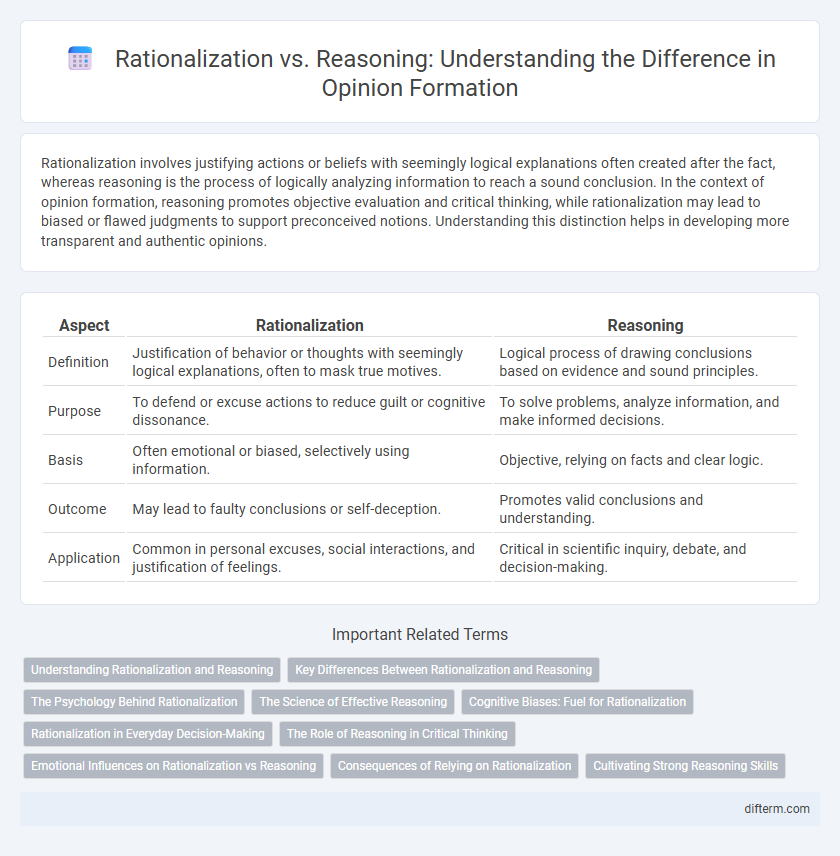Rationalization involves justifying actions or beliefs with seemingly logical explanations often created after the fact, whereas reasoning is the process of logically analyzing information to reach a sound conclusion. In the context of opinion formation, reasoning promotes objective evaluation and critical thinking, while rationalization may lead to biased or flawed judgments to support preconceived notions. Understanding this distinction helps in developing more transparent and authentic opinions.
Table of Comparison
| Aspect | Rationalization | Reasoning |
|---|---|---|
| Definition | Justification of behavior or thoughts with seemingly logical explanations, often to mask true motives. | Logical process of drawing conclusions based on evidence and sound principles. |
| Purpose | To defend or excuse actions to reduce guilt or cognitive dissonance. | To solve problems, analyze information, and make informed decisions. |
| Basis | Often emotional or biased, selectively using information. | Objective, relying on facts and clear logic. |
| Outcome | May lead to faulty conclusions or self-deception. | Promotes valid conclusions and understanding. |
| Application | Common in personal excuses, social interactions, and justification of feelings. | Critical in scientific inquiry, debate, and decision-making. |
Understanding Rationalization and Reasoning
Rationalization involves justifying decisions or beliefs after the fact, often to avoid discomfort or cognitive dissonance, whereas reasoning is a deliberate, logical process aimed at reaching well-founded conclusions. Understanding rationalization exposes how unconscious biases and emotional motives can distort judgment, while reasoning promotes critical thinking by evaluating evidence objectively. Effective decision-making requires recognizing when rationalization clouds reasoning to ensure clarity and truth in problem-solving.
Key Differences Between Rationalization and Reasoning
Rationalization involves justifying actions or beliefs with seemingly logical explanations after the fact, often to avoid admitting mistakes or uncomfortable truths. Reasoning, on the other hand, is a deliberate process of analyzing facts and evidence to reach valid conclusions, emphasizing objectivity and critical thinking. Key differences include the intent behind the process, with rationalization aimed at self-defense, while reasoning seeks genuine understanding and problem-solving.
The Psychology Behind Rationalization
Rationalization is a psychological defense mechanism that allows individuals to justify behaviors or feelings by creating seemingly logical explanations, even when these are not the true reasons. Unlike reasoning, which involves objective analysis and critical thinking, rationalization often serves to protect self-esteem and reduce cognitive dissonance. Understanding the mechanisms behind rationalization illuminates how people unconsciously distort reality to avoid confronting uncomfortable truths.
The Science of Effective Reasoning
The Science of Effective Reasoning emphasizes the distinction between rationalization and reasoning by highlighting that reasoning involves objective analysis and evidence-based conclusions, whereas rationalization often serves as a post hoc justification for preconceived beliefs. Cognitive science research demonstrates that effective reasoning requires critical thinking skills, minimizing cognitive biases, and applying logical frameworks to evaluate arguments systematically. Neuroscientific studies link reasoning processes to activity in the prefrontal cortex, underscoring the importance of deliberate, reflective thought over automatic rationalizations.
Cognitive Biases: Fuel for Rationalization
Cognitive biases such as confirmation bias and motivated reasoning often distort objective analysis, serving as fuel for rationalization rather than genuine reasoning. These biases lead individuals to selectively interpret information to support preexisting beliefs, undermining critical thinking and promoting self-justification. Recognizing and mitigating cognitive biases is essential to foster authentic reasoning and minimize rationalization in decision-making processes.
Rationalization in Everyday Decision-Making
Rationalization in everyday decision-making often involves justifying choices after the fact to reduce cognitive dissonance, masking true motivations with seemingly logical explanations. This process can lead to biased judgments as individuals prioritize emotional comfort over objective analysis. Understanding the distinction between genuine reasoning and post-hoc rationalization is essential for improving decision quality and fostering self-awareness.
The Role of Reasoning in Critical Thinking
Reasoning serves as the cornerstone of critical thinking by enabling individuals to analyze evidence, evaluate arguments, and draw logical conclusions based on sound principles. Unlike rationalization, which often distorts facts to justify preconceived beliefs, effective reasoning promotes objective assessment and cognitive clarity. Mastery of reasoning skills enhances decision-making processes and fosters intellectual integrity in complex problem-solving scenarios.
Emotional Influences on Rationalization vs Reasoning
Emotional influences often skew rationalization by prompting biased justifications that protect self-esteem rather than seeking objective truth. Reasoning relies more on logical analysis and evidence evaluation, minimizing emotional interference to arrive at sound conclusions. Understanding these differences helps mitigate emotional distortions in decision-making processes.
Consequences of Relying on Rationalization
Relying on rationalization often leads to distorted perceptions and hindered personal growth by justifying poor decisions instead of addressing underlying issues. This defense mechanism can perpetuate denial, reducing accountability and impairing problem-solving capabilities. Over time, habitual rationalization weakens critical thinking skills, resulting in repeated mistakes and impaired judgment.
Cultivating Strong Reasoning Skills
Cultivating strong reasoning skills involves developing the ability to analyze information critically and draw logical conclusions based on evidence, rather than relying on rationalization, which often justifies beliefs or actions without sufficient basis. Emphasizing reasoning fosters intellectual honesty and clarity, enabling individuals to solve problems effectively and make informed decisions. Strengthening these skills enhances cognitive resilience by promoting open-mindedness and reducing cognitive biases.
rationalization vs reasoning Infographic

 difterm.com
difterm.com